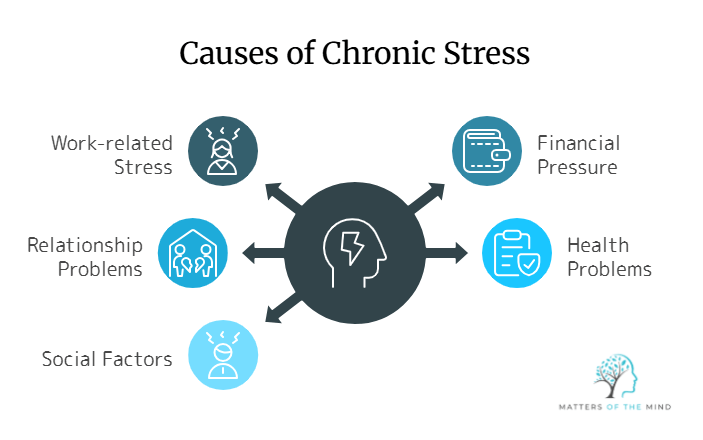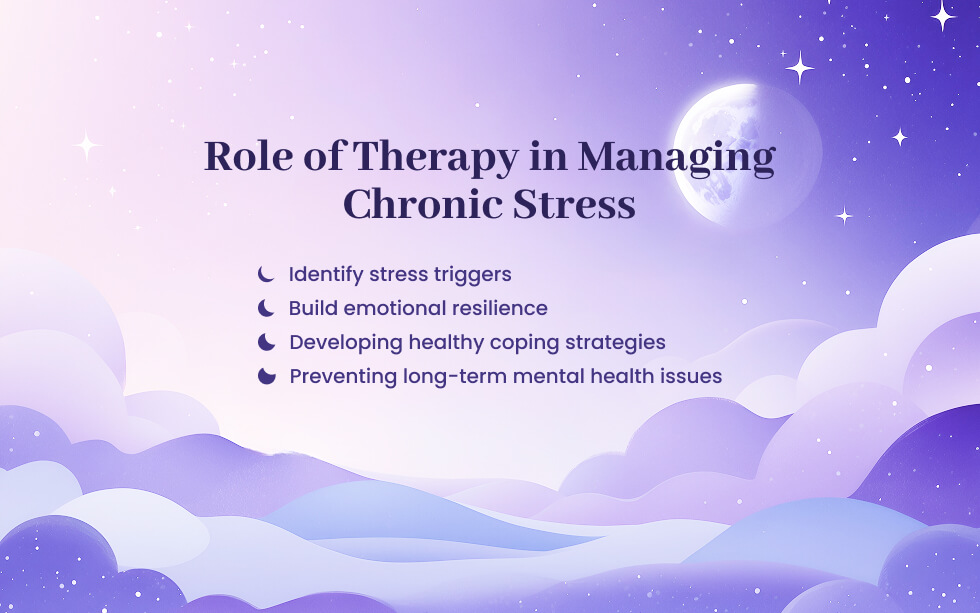What is Chronic Stress?
Common Causes of Chronic Stress

1. Work-related stress
- High workload, tight deadlines, job insecurity
- Difficult relationships with coworkers
- Lack of work-life balance
2. Financial pressure
- Unexpected finances or financial stability
- Worrying about future financial security
- Struggling with day-to-day expenses
3. Relationship problems
- Ongoing conflicts with partner, family member, or friend
- Divorce, separation, and loss of a loved one
- Lack of emotional support in personal relationships
4. Health problems
- Managing a chronic illness or pain
- Caring for sick loved one
- Excessive medical bills and treatments
5. Social factors
- Feeling isolated or lacking a support system
- Exposure to violence, discrimination, and social injustice
- Sudden economic downturns or pandemic
How Chronic Stress Affects Mental Health
1. Increased risk of anxiety and depression
2. Emotional dysregulation
3. Sleep disturbances
4. Increased risk of burnout
5. Lack of focus and memory issues
Continuous overthinking and stress increase the level of the stress hormone cortisol in the body. This can impair memory, reduce concentration on daily tasks, and make it harder to focus and retain information.
For more insights on how to manage stress effectively, read our blog: Ways to Manage Stress
Role of Therapy in Managing Chronic Stress

1. Identify stress triggers
2. Build emotional resilience
3. Developing healthy coping strategies
4. Preventing long-term mental health issues
Without proper care, chronic stress can lead to anxiety, depression, and burnout that affects daily activities. Therapy assists with mental and emotional balance before stress leads to serious health complications.
Several therapy approaches are highly effective in stress management, some of them are listed below:
Cognitive Behavioural Therapy (CBT): Helps change negative thought patterns and develop healthy coping strategies.
Summing Up
Chronic stress can be challenging, but it doesn’t have to control your life. By understanding the causes and choosing effective therapy, you can break the stressful cycle of vicious thoughts. Therapies offer proven strategies to manage stress, build emotional resilience, and develop healthier coping strategies.
This Stress Awareness Month, take the opportunity to prioritise your mental health. Your mental health matters, and you don’t have to compromise or neglect it. With the right support, you can navigate it with confidence and live a healthier life.
Break the Cycle of Stress and Start Your Healing Journey!
Dr Deepak Kavita-Knights: A renowned Clinical Psychologist in Windsore, Berkshire provides
- Personalised Therapy for Stress & Anxiety
- Evidence-Based Approaches: CBT, ACT, DBT & Mindfulness
- Support for a Healthier, Balanced Life


